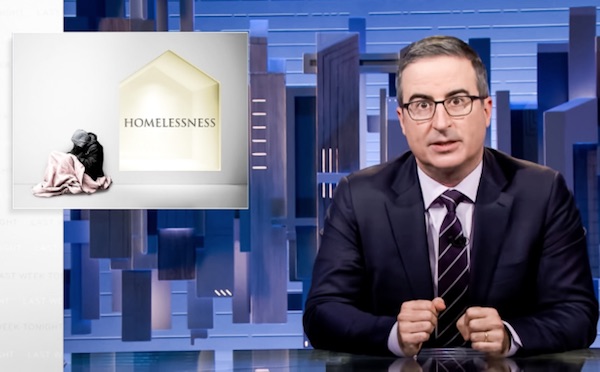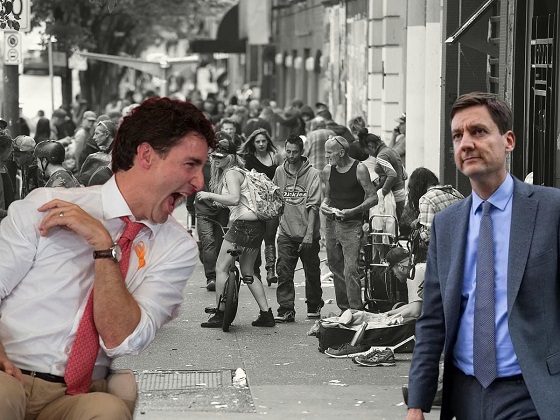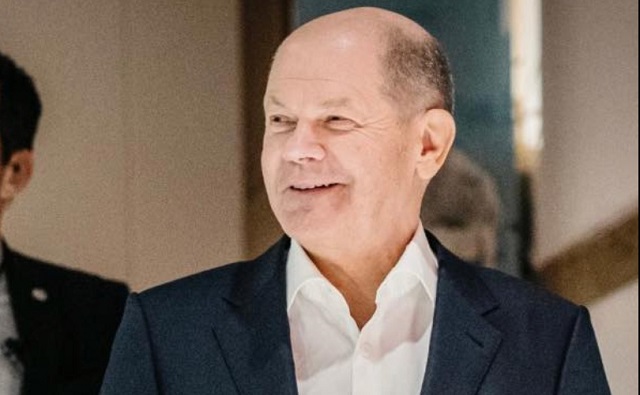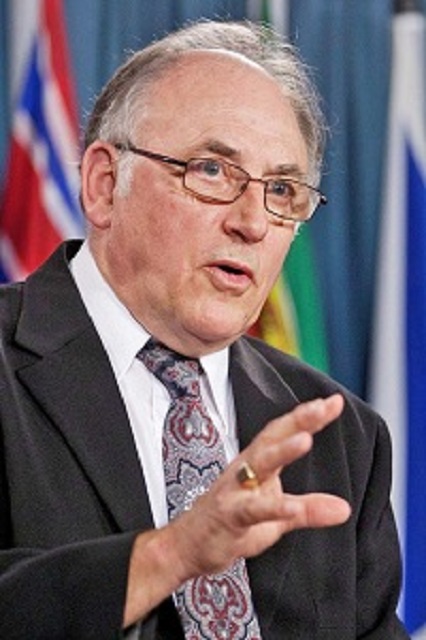Opinion
Why treating the Homesless as victims only makes the problem worse

This article is from Substack
Bestselling author Michael Shellenberger has just published a new book, “San Fransicko” about the homeless crisis in San Francisco. Shellenberger has lived in San Fransisco for 30 years. In “San Fransicko” Shellenberger argues one of the root causes of the homeless crisis sweeping cities all over America (and Canada) is the victimization of homeless people. In this article, Michael Shellenberger talks about the prevalent theory that homeless people are all victims as portrayed by TV Host John Oliver.
Why John Oliver Is Wrong About Homelessness
HBO TV Comedian Repeats Myth that the Homeless Are Just Poor People in Need of Subsidized Housing
The intelligent and hilarious HBO comedian John Oliver last night aired a 25-minute segment on homelessness. In it, he attributed homelessness to poverty, high rents, and NIMBY neighborhood activists who block new housing developments. Oliver showed interviews with homeless people who say they would like to work full-time but are unable to do so because they have to live in homeless shelters.
Unfortunately, Oliver’s segment repeated many myths that are easy to debunk. The vast majority of people we call “homeless” are suffering from serious mental illness, addiction, or both. We do a great job of helping mothers and others who don’t suffer from addiction or untreated mental illness to benefit from subsidized housing, but don’t mandate the psychiatric and addiction care that many “homeless” require. And the best-available, peer-reviewed science shows that “Housing First” agenda Oliver promotes fails on its own terms, worsens addiction, and is one of the main reasons homelessness has grown so much worse.
It’s true that we need more housing and voluntary addiction and psychiatric care, including what is called “permanent supportive housing” for people suffering from mental illness. In my new book, San Fransicko, I advocate for universal psychiatric care, drug treatment on demand, and building of more shelter space for the homeless. And Oliver is right that the U.S. lacks the social safety net that European and other developed nations have.
But Oliver badly misdescribes the problem. For example, he notes that some cities lack sufficient homeless shelter. But he doesn’t acknowledge that it has been “Housing First” homelessness advocates who caused the lack of shelter by demanding that funding be diverted to apartments often costing $750,000 each.
And Oliver promotes policies that have made addiction, mental illness, and homelessness worse. He claims homelessness causes addiction when it is far more often the other way around. And Oliver completely ignores the overwhelming body of scientific research showing that using housing as a reward for abstinence, rather than giving it away as a right, is essential to reducing homelessness by reducing addiction.
Oliver was wrong to encourage more of the same policies that caused homelessness to increase in the U.S. over the last decade, but also wrong for suggesting that anyone who disagreed with him were racist and NIMBY “dicks” who cause violence against homeless people. Oliver closes his segment by ridiculing a white woman who expresses concern about subsidized housing bringing the homeless into her neighborhood.
Why is that? Why does such an intelligent, thoughtful, and compassionate journalist repeat easily-debunked myths about homelessness?
Part of it is just ignorance. Oliver appears to have relied entirely on Housing First advocates and not read anything that questions their narrative. As I document in San Fransicko, homeless advocates are not just small service providers but major academics at top universities including Columbia University and University of California, San Francisco. Those “Housing First” advocates have received hundreds of millions in grants from Marc Benioff, John Arnold, George Soros, and other donors to promote the notion that Housing First works.
Another part of it is ideological. Housing First advocates believe that housing, not shelter, is a right, and that governments have a moral obligation to provide it. They have spent 20 years trying to prove that giving away housing to addicts and the mentally ill works, but the studies show that it fails to address addiction and thus even keep people in apartments at higher rates than other methods. The only thing proven to work is to make housing a reward for good behavior, mostly abstinence but also things like taking one’s psychiatric medicines, and going to work.
The dominant view among progressives of homelessness, drugs, and mental illness stems from victim ideology, which was born in the 1960s. Starting in the late 1960s, progressives attacked any effort to hold people who receive welfare or subsidized accountable as “blaming the victim.” Today, many progressives even view drug dealers as victims.
Victim ideology categorizes people as victims or oppressors, and argues that nothing should be demanded of people categorized as victims. This is terrible for the mentally ill, who often need to be coerced into taking their medicines, so they don’t end up breaking the law, hurting people or themselves, and winding up in prison. And this is terrible for addicts, who need to be arrested, when breaking laws related to their addiction, such as public drug use, shoplifting, and public defecation.
In the end, Oliver’s 25 minute segment on homelessness is a perfect encapsulation of victim ideology and why it is so wrong on both the facts and on ethics. On the facts, Oliver misdescribes a homeless woman who is likely suffering from mental illness and/or drug addiction as merely down on her luck. And Oliver mixes together apparently sober and sane homeless families, temporarily down on their luck, with people are on the street because of addiction and untreated mental illness. Doing so is wrong, analytically, but also wrong, morally, since most addicts and the mentally ill need something very different from just a subsidized apartment unit.
If we are to solve homelessness rather than make it worse, we need intelligent and thoughtful comedians and influencers like Oliver to do their homework, rather than to repeat myths. I researched and wrote San Fransicko, in part, to make it easier for people to get the facts, rather than repeat what we were told, and to see that there’s a better way to help the homeless, whether addicted to drugs, mentally ill, or not.
The good news is that the conversation around drugs and homelessness is changing rapidly because the situation on the ground has grown so much worse. Environmental Progress and the California Peace Coalition are at the very beginning of our efforts to educate journalists, policymakers, and the public. And San Fransicko was published just three weeks ago.
As time passes, many Americans will see the consequence of treating what is fundamentally a problem of untreated mental illness and addiction as a problem of poverty, high rents, and NIMBYs. And some of them, perhaps even comedians like John Oliver, will come to find humor, and humility, from the fact that so many of us got it so wrong.
Censorship Industrial Complex
Australian politicians attack Elon Musk for refusing to remove video of Orthodox bishop’s stabbing

Photo by Leon Neal/Getty Images
From LifeSiteNews
By David James
The video is available on YouTube but Australia’s political class is singling out and waging war on X owner Elon Musk for his refusal to delete footage of the stabbing of Orthodox Bishop Mar Mari Emmanuel.
In a demonstration of governmental overreach the Australian prime minister, Anthony Albanese, has attacked Elon Musk, the owner of X (formerly Twitter) for not acceding to demands to put a worldwide ban on video footage of an attempted stabbing of a bishop in a Sydney church.
Albanese is not alone; virtually the entire Australian political class has joined in the attack. Tanya Plibersek, minister for Environment and Water called Musk an “egotistical billionaire.” Greens senator Sarah Hanson-Young described him as a “narcissistic cowboy.” Albanese chimed in by describing him as an “arrogant billionaire who thinks he’s above the law.”
Senator Jacqui Lambie went as far as suggesting that Musk be “jailed” for his refusal to bend to the demands of the Australian government.
In response to Lambie’s comments, Musk declared her to be an “enemy of the people of Australia,” agreeing with another social media user who suggested it should be Lambie, not Musk, who belongs in jail.
This Australian Senator should be in jail for censoring free speech on X. https://t.co/vnYvBjpXav
— Rothmus 🏴 (@Rothmus) April 23, 2024
The right wing Liberal-National coalition was only slightly less aggressive saying Musk was offering an “insulting and offensive argument” in his refusal to remove graphic footage of the stabbing. How Musk saying that posts should not be taken down is “insulting and offensive” was not explained.
The victim of the attack, Bishop Mar Mari Emmanuel, an Iraqi-born Assyrian Australian prelate who is head of the Eastern Christ the Good Shepherd Church, has displayed a maturity and moral virtue conspicuously lacking in the political arena. Emmanuel recorded a message saying that he loved his assailant, and that he wanted the video to stay online, urging people not to respond to violence with violence.
After the incident there were riots outside the church, resulting in 51 officers sustaining injuries. A 16-year-old boy has been arrested and charged with a religiously motivated terrorist attack.
The court battle between the Australian government and Musk is being characterised as a contest between free speech and the government’s role in protecting people. Certainly for Musk it is very much about protecting free speech.
That formulation is inaccurate. There is no effective protection of free speech in Australia, unlike the US, which has the First Amendment of the Constitution. The Federal government is currently preparing a misinformation and disinformation bill to force social media companies only to allow content of which the government approves.
As Senator Ralph Babet of the United Australia Party observes it is a “censorship agenda” that will be pushed no matter which party is in power. “The office of the eSafety commissioner was created under the Liberal Party and is now being emboldened by the Labor Party,” he writes.
The public battle with Musk is better seen as an attempt by the Australian government to control what is on the internet. The newly appointed eSafety commissioner, Julie Inman-Grant directed X to remove the posts, but X had only blocked them from access in Australia pending a legal challenge. The government then demanded that the posts be removed world-wide.
That the Australian political class thinks it has the right to issue edicts in countries where it has no legal jurisdiction is a demonstration of the lack of clarity in their thinking, and the intensity of their obsession with censoring.
Musk accurately characterised the situation in a post: “Should the eSafety Commissar (an unelected official) in Australia have authority over all countries on Earth?” It seems that many Australian politicians think the answer to that question is “Yes.”
The childish personal attacks on Musk, typical ad hominem attacks (going at the person rather than the argument) are revealing. What does the fact that Musk is a billionaire have to do with the legal status of the posts? Does having a lot of money somehow disqualify him from having a position?
If he is “egotistical” or “arrogant” what does that have to do with his logical or legal claims? How does exposing Musk as a narcissistic cowboy” have any relevance to him allowing content on the platform? Wouldn’t a narcissist be more likely to restrict content? The suspicion is that the politicians are resorting to such abuse because they have no argument.
The Australian government’s attack on Musk, which borders on the absurd, is just one of many being directed at X. An especially dangerous initiative is coming from the European Union’s Digital Services Act, which can apply fines of up to 6 per cent of the worldwide annual turnover, a ridiculously punitive amount. The United Kingdom’s communications regulator, Ofcom is even worse. It will have powers to fine companies up to 10 per cent of their global turnover.
Western governments are mounting an all out push to censor the internet, and Australia’s aggressive move is just part of that. What is never considered by governments and bureaucrats is the cost of such censorship.
The benefits of “protecting” people are always overstated and inevitably infantilize the population. The price is a degradation of social institutions and a legal system that does not apply equally to the citizenry and to the government. It is a step towards tyranny: rule by law rather than rule of law.
Business
UN plastics plans are unscientific and unrealistic

News release from the Coalition of Concerned Manufacturers and Businesses of Canada
“We must focus on practical solutions and upgrading our recycling infrastructure, not ridiculous restrictions that will harm our health care system, sanitary food supply, increase costs and endanger Canadians’ safety, among other downsides.”
This week Ottawa welcomes 4,000 delegates from the United Nations to discuss how they will oversee a reduction and even possible elimination of plastics from our lives. The key problem is no one has ever figured out how they will replace this essential component of our modern economy and society. The Coalition of Concerned Manufacturers and Businesses of Canada (CCMBC) has launched an information campaign to discuss the realities of plastic, how it contributes massively to our society and the foolishness of those who think plastics can be eliminated or greatly reduced without creating serious problems for key industries such as health care, sanitary food provision, many essential consumer products and safety/protective equipment, among others. CCMBC President Catherine Swift said “The key goal should be to keep plastics in the economy and out of the environment, not eliminate many valuable and irreplaceable plastic items. The plastics and petrochemical industries represent about 300,000 jobs and tens of billions contribution to GDP in Canada, and are on a growth trend.”
The UN campaign to ban plastics to date has been thwarted by reality and facts. UN efforts to eliminate plastics began in 2017, motivated by such terrible images as rivers with massive amounts of floating plastic and animals suffering from negative effects of plastic materials. Although these images were dramatic and disturbing, they do not represent the big picture of what is really happening and do not take into account the many ways plastics are hugely positive elements of modern society. Swift added “Furthermore, Canada is not one of the problem countries with respect to plastics waste. Developing countries are the main culprits and any solution must involve helping the leading plastics polluters find workable solutions and better recycling technology and practices.”
The main goal of plastic is to preserve and protect. Can you imagine health care without sanitary, flexible, irreplaceable and recyclable plastic products? How would we keep our food fresh, clean and healthy without plastic wraps and packaging? Plastic replaces many heavier and less durable materials in so many consumer products too numerous to count. Plastics help the environment by reducing food waste, replacing heavier materials in automobiles and other products that make them more energy-efficient. Many plastics are infinitely recyclable and innovations are taking place to improve them constantly. What is also less known is that most of the replacements for plastics are more expensive and actually worse for the environment.
Swift stated “Environment Minister Steven Guilbeault has been convinced by the superficial arguments that plastics are always bad despite the facts. He has pursued a campaign against all plastics as a result, without factoring in the reality of the immense value of plastic products and that nothing can replace their many attributes. Fortunately, the Canadian Federal court overturned his absurd ban on a number of plastic products on the basis that it was unscientific, impractical and impinged upon provincial jurisdiction.” Sadly, Guilbeault and his Liberal cohorts plan to appeal this legal decision despite its common-sense conclusions. Opinion polls of Canadians show that a strong majority would prefer this government abandon its plastics crusade at this point, but history shows these Liberals prefer pursuing their unrealistic and costly ideologies instead of policies that Canadians support.
The bottom line is that plastics are an essential part of our modern society and opposition has been based on erroneous premises and ill-informed environmentalist claims. Swift concluded “Canada’s record on plastics is one of the best in the world. This doesn’t mean the status quo is sufficient, but we must focus on practical solutions and upgrading our recycling infrastructure, not ridiculous restrictions that will harm our health care system, sanitary food supply, increase costs and endanger Canadians’ safety, among other downsides.” The current Liberal government approach is one that has no basis in fact or science and emphasizes virtue-signaling over tangible and measurable results. Swift noted “The UN’s original founding purpose after World War II was to prevent another world war. Given our fractious international climate, they should stick to their original goal instead of promoting social justice warrior causes that are unhelpful and expensive.”
The CCMBC was formed in 2016 with a mandate to advocate for proactive and innovative policies that are conducive to manufacturing and business retention and safeguarding job growth in Canada.
SOURCE Coalition of Concerned Manufacturers and Businesses of Canada
-

 Alberta23 hours ago
Alberta23 hours agoRed Deer Doctor critical of Alberta’s COVID response to submit report to Danielle Smith this May
-

 conflict1 day ago
conflict1 day agoCol. Douglas Macgregor torches Trump over support for bill funding wars in Ukraine and Israel
-

 Business7 hours ago
Business7 hours agoDon’t be fooled by high-speed rail
-

 COVID-192 days ago
COVID-192 days agoInquiry shows Canadian gov’t agencies have spent $10 million on social media ads for COVID jabs
-

 Alberta6 hours ago
Alberta6 hours agoActivity-Based Hospital Funding in Alberta: Insights from Quebec and Australia
-

 Business2 days ago
Business2 days agoFederal government’s ‘fudget budget’ relies on fanciful assumptions of productivity growth
-

 Health1 day ago
Health1 day agoTransgender activists are threatening the author of scathing UK report on child ‘sex changes’
-

 Business4 hours ago
Business4 hours agoUN plastics plans are unscientific and unrealistic










